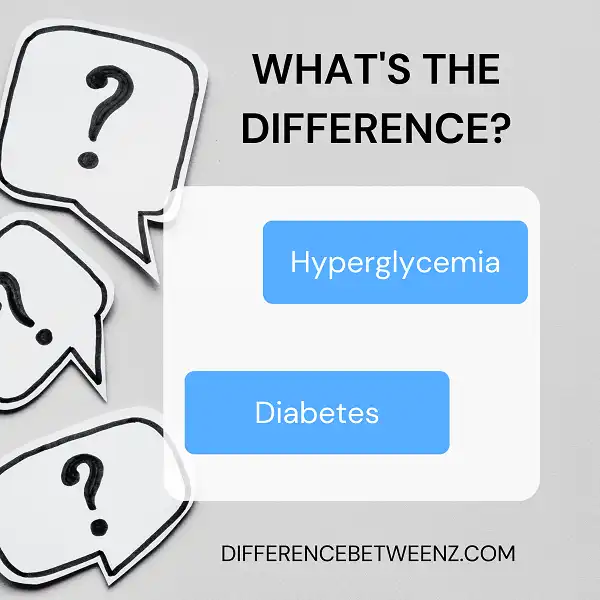Hyperglycemia and diabetes are two medical conditions that many people are familiar with, but for some, understanding the difference between them can be confusing. Hyperglycemia is an increase in a person’s blood glucose levels above normal which is most often caused by eating too much carbohydrate-rich food or from not taking enough insulin if you’re diabetic. Diabetes, on the other hand, is a chronic condition where your body has difficulty regulating its own blood sugar. In this post, we will go over what each of these conditions means, their differences, and why it’s important to understand them both.
What is Hyperglycemia?
Hyperglycemia and diabetes are two terms that are often used interchangeably but have distinct differences. Hyperglycemia is a condition in which one’s blood glucose or sugar levels are higher than normal. Hyperglycemia can either be caused by not taking enough insulin for a diabetic or eating too much sugar, leading to an increase in blood glucose.
Diabetes, on the other hand, is more of a chronic condition where the body has difficulty regulating its blood sugar levels, usually due to a lack of insulin being produced by the pancreas or cells being insensitive to the presence of insulin. Unlike Hyperglycemia which can be temporary, diabetes requires constant monitoring and treatment over a long period. It is important to differentiate between hyperglycemia and diabetes because hyperglycemia can be managed with diet changes but if untreated could lead to complications associated with diabetes.
What is Diabetes?
- Diabetes is a chronic medical condition that affects the way the body metabolizes glucose, the main source of energy for our cells. Diabetes occurs when there is an imbalance between glucose production and consumption in the body, leading to excessive amounts of glucose in the blood.
- Diabetes can affect people of all ages and genders, but it is especially important to be aware of this as it can lead to serious consequences if left untreated. Diabetes can cause long-term damage to your organs, such as your eyes, kidneys, heart, and blood vessels; damage that may not be reversed even with effective diabetes management.
- Fortunately, advances in medicine have provided more options for managing and controlling diabetes so if you or someone you know may have any signs or symptoms of diabetes, consulting a healthcare professional for diagnosis should be a priority.
Difference between Hyperglycemia and Diabetes
Hyperglycemia and diabetes are two terms that are often used interchangeably but have distinct differences.
- Hyperglycemia is a condition in which one’s blood glucose or sugar levels are higher than normal. Hyperglycemia can either be caused by not taking enough insulin for a diabetic or eating too much sugar, leading to an increase in blood glucose.
- Diabetes, on the other hand, is more of a chronic condition where the body has difficulty regulating its blood sugar levels, usually due to a lack of insulin being produced by the pancreas or cells being insensitive to the presence of insulin. Unlike Hyperglycemia which can be temporary, diabetes requires constant monitoring and treatment over a long period.
It is important to differentiate between hyperglycemia and diabetes because hyperglycemia can be managed with diet changes but if untreated could lead to complications associated with diabetes.
Conclusion
Hyperglycemia, diabetes, and prediabetes are all serious health conditions. It is important to be able to distinguish between them in order to get the correct diagnosis and treatment. We hope this article has helped you understand the difference between hyperglycemia and diabetes. If you have any questions or concerns, please talk to your doctor.


